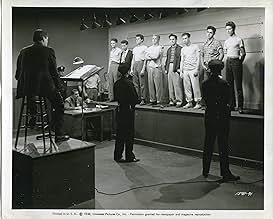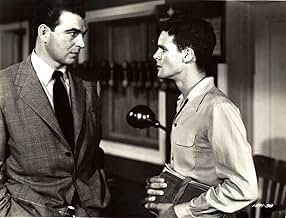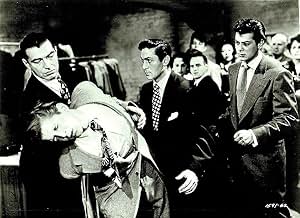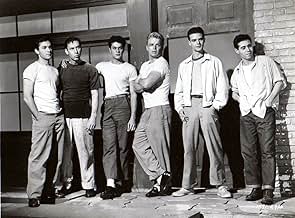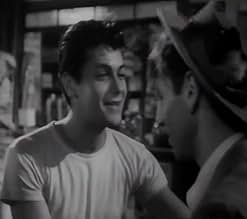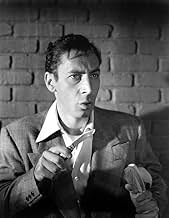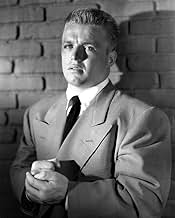Adicionar um enredo no seu idiomaThe macho head of an urban community center tries to reform juvenile delinquents.The macho head of an urban community center tries to reform juvenile delinquents.The macho head of an urban community center tries to reform juvenile delinquents.
- Direção
- Roteiristas
- Artistas
- Mitch
- (as Anthony Curtis)
Avaliações em destaque
One exception was City Across The River, based on Irving Shulman's novel The Amboy Dukes. Though noirish in its look and urban setting, it's probably safe to call it a social-message movie (as was Nicholas Ray's Knock On Any Door, of the same year). It takes us to the slums of Brooklyn at a time when slums were slums and when conventional wisdom held that the root of juvenile delinquency was the turn-of-the-century tenements themselves the physical plant, not the inculturated attitudes that perpetuate the culture of poverty and crime.
Peter Fernandez plays the central character of the story, a teen-ager whose parents work holidays and double-shifts to make ends meet (his mom is Thelma Ritter). But he hangs around with members of a `club' called The Dukes (among them `Anthony' Curtis), whose older members seem to be rising lieutenants in the world of petty crime. Of course, in accordance with the official idiom of the times, the toughs caper and cavort like The Dead End Kids, and the worst epithet they hurl at one another is `you crumb.'
Fernandez and friend confront a shop teacher who's responsible for their suspension and accidentally kill him with one of the zip-guns that seem to be the main enterprise of the school's industrial-arts program. In fear and panic, they not only raise suspicion but burn most of their bridges behind them. The movie ends unsentimentally even harshly.
The task of directing fell to the unlikely Maxwell Shane, whose most polished credits in the noir cycle are Fear in The Night and its remake Nightmare, oneiric cheapies that created a fantasy world. Yet he does surprisingly effective work in City Across the River, putting together a plausible neighborhood of vegetable peddlers, candy shops and pool halls. Despite the dated and bowdlerized street argot, the movie stays involving and humane without retreating into cliche (Fernandez' fall isn't assigned an easy scapegoat) or crocodile tears.
During this era, there were a lot of exploitation films about 'youth gone wild', though I wouldn't place "City Across the River" in this category. It's not so much exploitation but more like a Dead End Kids movie combined with film noir. Overall, a decent picture...though the preachy prologue and epilogue was NOT necessary in the least.
By the way, if you watch the film look for young Tony Curtis and Richard Jaekel as two of the hoodlums in the gang.
This was Tony Curtis' first credited appearance. He played Mitch under his original billing of Anthony Curtis. He was first discovered by fans while dancing, uncredited, with Yvonne de Carlo in Criss Cross.
The story concerns a Brooklyn neighborhood gang, The Dukes. They're tough kids who take occasional jobs from goombas where they beat someone up, carry handmade guns, go to trade school and can be difficult with teachers.
On the other side is the community center, run by Stan Albert (Stephen McNally), who knows the kids and tries to get them involved in things like basketball. Frankie (Peter Fernandez) is basically a good kid who has been involved with the center, but has fallen in with the Dukes.
His hard-working parents (Thelma Ritter and Luis van Rooten) want to get out of the neighborhood. Frankie's father decides to give up his dream of a grocery store in a better area and instead use their savings to purchase a house. However, a hospital bill takes that money.
The Dukes get into big trouble with a teacher, Mr. Bannon (Robert Osterloh). He demands to see the Dukes' parents. Frankie and Benny (Al Ramsen) try later to reason with him, Benny's zip gun goes off, killing Bannon.
The cops (Jeff Corey and Al Eben) know Frankie was involved, but he won't talk.
A depressing film in a way - even though it was 70 years ago, people still work hard to attempt to better themselves, and it remains difficult. We still have bored, disenfranchised kids everywhere. Dismal.
The actors are very good. Curtis has a small part, but he makes a perfect juvenile. The rest of the gang - those mentioned, plus Joshua Shelley, Richard Jaeckel, Mickey Knox, and Joe Turkel.
The production values aren't as high as other films focusing on juveniles, but the realistic, gritty presentation is right for the subject matter. Maxwell Shane did an effective directing job. Someone commented parts of the area looked like postwar Berlin - true.
It's almost kind of quaint, but sadly so in that these kids spend time in shop class making zip guns. Very soon all kinds of weaponry would be available for street gangs right down to today.
And how things have changed. Back then one aspired like Luis Van Rooten and Thelma Ritter to move to a place like Canarsie. Now no one aspires to move to Canarsie.
Van Rooten and Ritter are the parents of Peter Fernandez and Sharon McManus and Fernandez is a member of the Amboy Dukes. Social worker Stephen McNally has some hopes of reaching him. But when he and pal Al Ramsen shoot shop teacher Robert Osterloh with one of those make it yourself weapons they become beyond the reach of social workers. And detective Jeff Corey suspects them from the beginning.
Fernandez and Ramsen had brief careers, but other members of the Dukes did a lot better. Richard Jaeckel certainly had a career of note already and Mickey Knox probably would have, but for the blacklist. And Tony Curtis stands far out in front of all of them. It was clear he was going to be star, in fact the film would have been better had he been in the lead instead of Fernandez.
City Across The River is a somewhat quaint look at Brooklyn when I was only two years old. According to Tony Curtis's memoirs some establishing shots were done there, but the cast filmed in Hollywood. It's one of the first films to deal with post war juvenile delinquency, even before West Side Story. Dated, but it holds up well.
Você sabia?
- CuriosidadesFilm debut of Peter Fernandez.
- Erros de gravaçãoAll the actors playing teenage members of the Dukes gang were well into their twenties when the movie was filmed.
- Citações
Drew Pearson: [opening speech] To most of us, the city where juvenile crime flourishes always seems to be 'the city across the river'. But don't kid yourself. It could be your city, your street, your house. Although this story happens in Brooklyn, it could just as well happen in any other large city where slum conditions undermine personal security and take their toll in juvenile delinquency. You may be lucky; you may be living where such conditions don't exist. But for the next 89 minutes, you're a kid named Frankie Cusack, going down a confused road toward gangsterdom, toward murder. You live in Brooklyn, just across the river from Manhattan, where Flatbush meets the slum. You're Frankie Cusack and this is your story. This is the main street of your neighbourhood, where you hang out with your gang. Busy by day, teeming at night. This is your country club, the Happy Times pool room, and this is your street. That tenement over there on the right is 62 years old. You were born there and it's the only home you ever had.
- Cenas durante ou pós-créditosFirst credited film appearance of Tony Curtis (as Anthony Curtis).
- ConexõesFollowed by Mercadoras da Noite (1953)
Principais escolhas
Detalhes
- Data de lançamento
- País de origem
- Idioma
- Também conhecido como
- City Across the River
- Locações de filme
- Empresa de produção
- Consulte mais créditos da empresa na IMDbPro
Bilheteria
- Faturamento bruto nos EUA e Canadá
- US$ 1.500.000
- Tempo de duração
- 1 h 31 min(91 min)
- Cor
- Proporção
- 1.37 : 1

